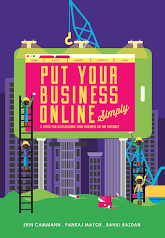How Much Should a Small Business Website Cost? Get a $25,000 solution for a fraction of the price

Once a small business makes the decision to boost their online presence, and leverages the power of internet to drive leads, a common question arises: how much will it cost to to build a website?
In short, the answer varies from business to business. But to get a general idea, it is important for small businesses to take a step back and determine exactly what purpose their website will serve.
Is it simply acting as a digital sign, a single-page presence that announces your existence to the world? Will there be customer interaction on the site, such as product sales, or appointment scheduling? Or, do you want to develop a full-service online business platform that incorporates customer relationship management (CRM) and in-depth data analytics?
Once you've determined the site's purpose, it's time to sift through the pros and cons of your website building options.
DIY Systems
Many do-it-yourself website builders, such as Wordpress or Weebly, seem alluring at first glance, because of their low cost. In reality, a DIY system can be an extremely complicated solution for the average small business owner to manage.
Although these website building tools have many plug-ins available which can be integrated onto a website, thus creating a robust online presence, they can be complicated to install and manage.
The client is responsible for managing the site's design and overall user experience, tracking user behavior, updating the site and any plug-ins that were installed, handling site security, and scaling the system up if their business grows. Many of these systems do not have a devoted support system, and customers rely on community forums if problems or questions arise.
What seemed at first the a simple, low-cost solution morphs into a sticky mess which often requires the help of a professional web developer. We've outlined this scenario below.
Custom Developers
Some small business owners would rather not tackle the task of building their own website and instead, hire a developer to do the job.
A custom developer has the technical skills and know-how to create a full-service website, but it typically comes at a steep cost. Developers tend to charge steep hourly rates, and many of the tasks involved in building a website -- design, programming, content creation -- take multiple hours.
One recent look at the tasks and costs involved in hiring a developer to build a website estimates that fees could rise to a hefty -- and shocking -- $25,000.
Platforms: The Best of All Worlds
Platforms offer an alternative to the previous scenarios. A platform is a single entity with a core set of functionalities that can be personalized by the businesses using it. Users don't have to install or update anything, because it is all managed behind the scenes. There's no need for downloading or managing plug-ins because they are already included as part of the platform's functionality. Popular platforms include Facebook and LinkedIn.
A website building platform includes the following features:
- a core web presence that the customer can update and personalize
- standard methods for content creation
- deep functionality like CRM tools, social network management, data mining, analytics, and integrated e-commerce
Compared to DIY tools or hiring a developer, platforms provide an enormous amount of functionality at a fraction of the price. Maintenance costs can be minimized because they are shared across all users of the platform.
With a website building platform like Ocoos, customers have access to a full-service concierge who works with them to build a site the fully meets their needs. The client is then given complete access to their site to make future updates as needed. Plus, Ocoos offers 24-hour, US-based support, should questions or issues arise.
Using a platform such as Ocoos can cost as little as $5,000, or one-fifth the price of other endeavors, while offering a clients a complete website solution.


